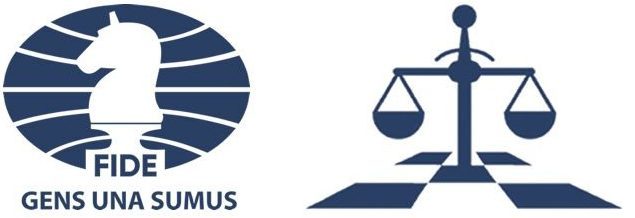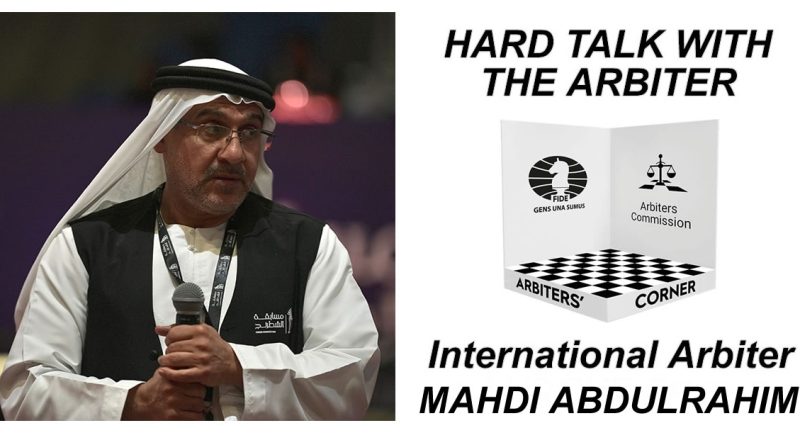HARD TALK WITH THE ARBITER – IA MAHDI ABDULRAHIM
Hard Talk with the Arbiter continues introducing International Arbiter Mahdi Abdulrahim from the UAE.
1. Please tell us about yourself, about your journey, and all the experiences you have gone through?
Certainly! Let me share with you the story of my journey and all the experiences I’ve had so far.
My name is Mahdi Abdelrahim, born in Dubai, United Arab Emirates. I am a certified air traffic controller and also have a diploma in business administration and information systems. I currently work as an executive director of the UAE Chess Federation. My interest in chess began when I was 12 years old. When I was 16 years old, my journey into arbitration began. I started as an assistant arbiter for the national and international tournaments organized by the UAE Chess Federation and the Dubai Chess and Culture Club.
I became a chess Arbiter and learned the laws of chess from the IA Mohamed Al-Husseiny (EGY), who works as a director of the Dubai chess club. I also learned from IA Imad Al-Ghalayni (PLE), the technical director of the UAE Chess Federation at that time, who played an important role in shaping my future. I was an arbiter in many local tournaments, but the turning point came in 1986 when I had the honor of being an arbiter at a major event held in the UAE and the Middle East, the 27th Chess Olympiad in Dubai. It was a great experience for me as I met world champions and chess legends from different countries, especially from the Soviet Union. Among them were Anatoly Karpov and Garry Kasparov, world champions of that time. As a young chess enthusiast, meeting these legends was a dream come true and I was able to take unforgettable photos with them, which I will treasure forever.
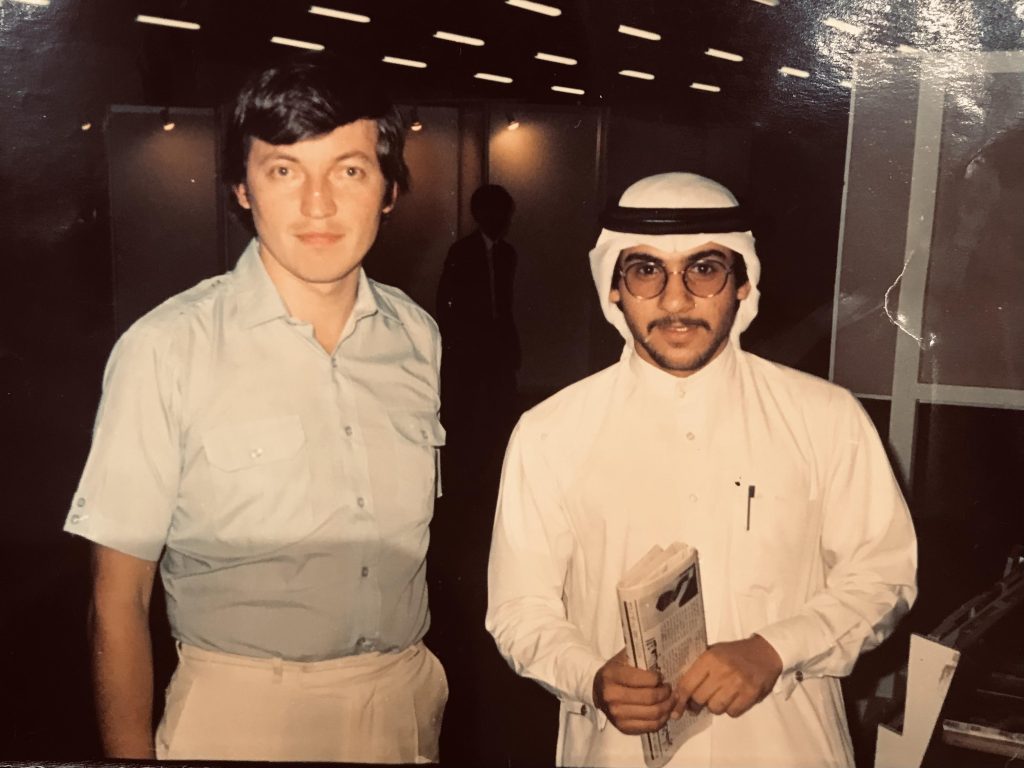
I continued my journey in arbitration in many tournaments, locally and internationally. In 1992, I was an arbiter in my first international event outside the UAE, the Chess Olympiad in Manila, Philippines. When I was 24 years old, I was awarded the title of international arbiter during the FIDE Olympiad Congress, making me the youngest international arbiter at that time. After that, I was assigned to the position of chief arbiter in many international events such as Arab and Asian tournaments. I also became an international lecturer, conducting many seminars and workshops in Arabic and English in 18 Arab countries and some Asian and African countries. I had the honor of being the main organizer of the World Amateur Chess Championship held in Muscat, Oman November 2023.
Throughout my journey, I have held many prestigious positions and leadership roles within the chess community. I have served as head of the arbiters’ committee for many years at the UAE Chess Federation, the Arab Chess Federation, and the Asian Chess Federation. Also, I have been a councillor for the FIDE arbiters commission for many years now. Also, I became the chairman of the FIDE Rules Commission from 2018 to 2022.
The most important aspects of my arbitration career are:
At the Arab level: I was a chief arbiter in 4 Arab games, including Algeria 2003, Doha 2007, Cairo 2011, and again Algeria 2023. Also, I have been chief arbiter for many years in individual and team tournaments. At the global level, I was chief arbiter at the World Rapid & Blitz Chess Championship in Dubai in 2014, the World Schools Chess Championship in Thailand in 2015, the World Championships’ Match Expo 2020 Dubai, and the FIDE World Cadet Championship Sharm El Sheikh-Egypt in October 2023. At the Asian level, I have been a chief arbiter at many tournaments, including individual Asian Continental championships and Asian Cities Teams. My last major tournament was the Saudi Games in which I worked as a chief arbiter.
2. What was the biggest difference for you when you progressed from FA to IA?
To be honest, I did not move from the title of FA to IA because, at that time, specifically in the 1990s, there was no FA title. It was only an international arbiters’ title. One of the conditions for obtaining it was that the arbiter must be professionally competent. He or she must have full knowledge of the laws of chess. He or she must have the required experience in local and international tournaments, namely, at least five tournaments. He or she must speak English adequately. Also, he or she must have the ability to make informed decisions. For the arbiter to be nominated for an international title, his or her file must be sent by the National Federation and he or she must be recommended for the title.
3. Arbitration is often called a thankless job. From players to experts to fans, everyone is critical of arbiters. How do you deal with criticism?
From my point of view, chess is very different from other games. It is not just an entertainment game, but rather a mental sport that relies on strategy and deep thinking. Arbiters manage matches accurately and professionally and have an in-depth knowledge of the laws of chess. Penalties are applied to violators based on these specific laws.
In chess, the role of arbiters is clear and well-known. There is no room for interpretation or objection to their decisions. Thus, there is a significant reduction in errors associated with the arbiters’ performance. Compared to other arbiter-based games, there can be overlap and different interpretations of the rules, leading to an increase in fouls. Through my arbitration experience, I have found very little criticism that we can stand on, and this is due to the arbiter’s lack of familiarity with the rules of chess properly, which results in a wrong decision that is criticized by players or others, and this is a rare thing, as I mentioned before. A good arbiter can maintain his arbitration performance without mistakes. He or she has to develop himself and follow developments and the latest updates in the Laws of Chess to avoid arbitration mistakes and criticism. Also, A good Arbiter applies the law and communicates it to the two players in a way that they are satisfied and accept the decision from him.
From my point of view, chess is very different from other games. It is not just an entertainment game, but rather a mental sport that relies on strategy and deep thinking.
Mahdi Abdulrahim
4. How has arbitration changed over the years?
As for the changes that have occurred in the field of arbitration over the years, several aspects have developed:
New electronic clocks with different time systems appeared, which made it easier for arbiters to set clocks and save time. Some penalties have changed. Technology has entered the field of arbitration through arbitrators following players via live transfer programs, and with the advancement of technology, we have more accurate arbitration tools, such as digital chess systems, computer analysis of moves, and detection of repeat moves.
The rule of adjourning games has been stopped. I can remember that the last time I encountered such a situation was at the World Chess Olympiad in Manila in 1992. My match was adjourned to 10 a.m. the next day after the last move had been written on the score sheet. Then play was resumed after opening the envelope with the sealed move in the presence of the players and the match Arbiter. Of course, as far as I know, there has been no adjournment since 1992 until now.
Changes in the rules of the game: Some of the rules of chess have been modified over the years, affecting the role of Arbiters. For example, the 50-move rule (if 50 moves are completed without capturing any pieces or moving any pawns, the match is considered a draw). The game of chess has also witnessed development in promoting gender equality, as women began to play a greater role in the game and arbitration as well. The International Chess Federation awarded at least 25 percent of the arbiters in official FIDE Events must be women. Training programs for Arbiters and lecturers have also been developed, which contributed to improving the level of arbitration and understanding of the rules. Communication with players and the public has become more transparent, and this enhances confidence in the arbiter’s work. In the end, arbitration in chess remains a task that requires knowledge and expertise.
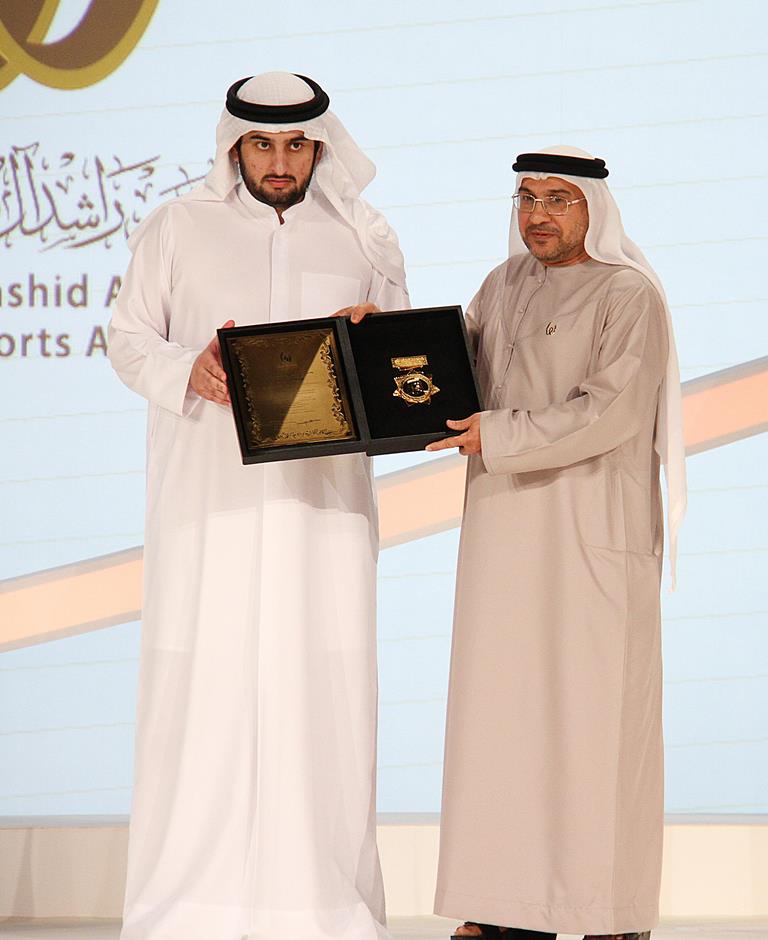
5. You were awarded the Sheikh Mohamed Bin Rashid Al Maktoum award as the best achieved outstanding creations at the local, Arab, and international levels as an arbiter in 2015. What outstanding creations did you achieve to deserve this award?
The Mohammed bin Rashid Al Maktoum Sports Creativity Award is one of the global initiatives launched by His Highness Sheikh Mohammed bin Rashid Al Maktoum, Ruler of Dubai and Prime Minister of the United Arab Emirates. This award aims to support and honor creative athletes in the UAE and the Arab world, whether they are players, sports referees” arbiters”, administrators, or coaches. Conditions for applying for the award have been set, and a special committee of award trustees has been identified through which the candidates are evaluated and the winners are selected annually. The Mohammed bin Rashid Al Maktoum Sports Creativity Award was launched in 2007 and aims to develop the sports movement in Dubai and create a sports environment that contributes to refining the talents of athletes and achieving continental and international achievements. The winners are honored at an annual ceremony held in Dubai in the presence of the Ruler, the Crown Prince of Dubai, or the Deputy Ruler. I received the award due to my being the most successful Emirati Chess Arbiter and an ambassador for the country in international forums. Also, I served as chief Arbiter in many international, World, Asian, and Arab championships during my arbitration career, as well as for holding many leadership positions in the sport of chess.
6. What do you think is the biggest misconception about arbiters?
Many people consider the task of a chess arbiter to be easy. Their role is simple, which is to record the score at the end of the match. Sitting on the chair, playing with the mobile phone, talking to others, and in the end, earning a sum of money. Of course, this is a misconception. There is more to it than meets the eye.
They must understand that chess arbiters are an essential part of the game and contribute to achieving fairness and discipline in the playing hall and monitoring matches from beginning to end. The arbiter has duties that must be performed before the start of the round, during play, and after its end. The match arbiter is evaluated by the chief arbiter or the sector arbiter. There is no room for the match arbiter to neglect the performance of his or her duties. People should know that the arbiter is subject to punishment, like the player, if he or she disobeys or does not adhere to his or her duty during the match. A penalty is imposed on him or her, such as being deprived of arbitration or losing his title if his or her mistake was a major one. The primary responsibilities of the chess arbiters are to monitor player movements and adhere to time controls, and other regulations such as actively preventing cheating by monitoring players for any suspicious behavior or unauthorized electronic devices or communications during matches. They also closely monitor matches, ensure fair play, detect violations, and resolve any problems that may arise. In short, a chess arbiter plays a vital role in ensuring that tournaments run smoothly, players adhere to the rules, and fair competition prevails.
…a chess arbiter plays a vital role in ensuring that tournaments run smoothly…
Mahdi Abdulrahim
7. Domestic tournaments can pose a challenging task. Out of the limelight, it can offer a stern test of character. What is the key to success as an arbiter at the first-class level?
A chess arbiter is an official who supervises the conduct of a chess tournament or a match. To succeed as a chess arbiter at the first division level, which is the highest level of domestic chess in most countries, one needs to have the following qualities:
– Knowledge of chess rules and regulations, such as chess laws, conditions of play, and rules of conduct. A chess arbiter must be able to apply them correctly and consistently in different situations. He or she can make quick and accurate decisions on the board, such as announcing the result, awarding penalties, or intervening in disputes. The chess arbiter must also be able to handle any complaints from players or organizers and be able to communicate clearly and effectively with players, organizers, spectators, and the media. He or she must be honest and fair in performing his duties and must avoid any conflict and maintain bias. He or she must respect the confidentiality and privacy of players and organizers. He or she must have a sufficient level of experience and training in arbitrating chess events of different formats and levels. The chess arbiter must also keep himself or herself informed of the latest developments and changes in the rules and regulations of the game of chess. These are some of the basic factors that can help a chess arbiter succeed at the first-class level. Also, in my opinion, the Arbiter should study the tournament before it starts. I intend to review the information regarding the work team of Arbiters, technicians, and the participating players, especially if among the tournament participants are international star players, so he knows how to deal with them.
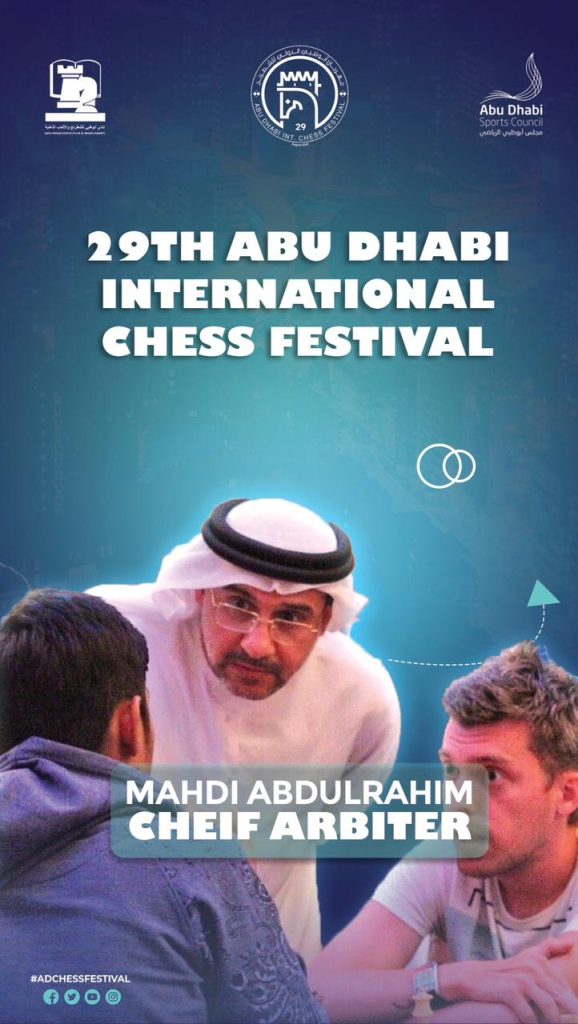
8. What has been your most embarrassing moment since you became an arbiter?
Several situations caused me embarrassment, but I will talk about one situation in particular in which I was chief arbiter at the Arab Games in Cairo in 2011. In the last round, in a fateful match, a player from the UAE women’s national team and a player from the Yemeni women’s national team took part. The UAE player was competing for the gold medal, and a draw was enough for her. I went to look at the match and found that the UAE player was superior and had many pieces. She could win in two moves, while her opponent only had several pawns and a king. I waited for a while to watch the match, and then the Emirati player stopped the clock and gave her opponent half a point to secure the medal. Of course, I did not like her behavior, and it was clear to me that there was an agreement on half a point in an unfair way. This was in front of an audience. At that moment, I decided to announce the loss of both players. This led to the Emirati player losing the gold medal. My position was very critical with the UAE Chess Federation board members, as they held me responsible for making them lose the medal.
9. What has been your happiest moment as an arbiter?
As an arbiter of a chess match, I feel happy when I witness special moments happening on the board. When teams and players are cooperative. That makes my life easy. When tournaments end without problems or objections from players or the audience. That gives me a lot of joy and relief. I always want to live up to my seniors’ expectations. When that happens, I am overjoyed.
These moments include Beautiful Checkmate: when a small or lower-ranked player succeeds in achieving a victory over his or her opponent who is stronger than him or her, through wonderful and innovative coordination. Humane Moments: when two players show understanding and respect for each other, whether it’s exchanging smiles or high-fives after the game. In the end, as an arbiter, the happiest moment for me is seeing the players enjoying the game and showing their best skills and creativity. Finally, my happiness is when the players come after finishing the tournament and congratulate me on my arbitering performance.
In the end, chess is not just a game. It is art, science, and a challenge. The happiest moment is when this art and science are embodied in front of my eyes, and I watch the players innovate and dazzle the world with their intelligence and creativity.
Mahdi Abdulrahim
In the end, chess is not just a game. It is art, science, and a challenge. The happiest moment is when this art and science are embodied in front of my eyes, and I watch the players innovate and dazzle the world with their intelligence and creativity.
10. What problems did you face as a chief arbiter during your last chess event and how did you solve them?
I was the chief arbiter at the World Cadet Chess Championships in Sharm El Sheikh-Egypt 2023. The first round was supposed to start on the second day of arrival. The FIDE representative GM Iashvili, Akaki, and I were surprised that the tournament hall was not ready to start on this day, especially when we were informed that the electronic boards would be delayed in the hall. So, we decided to postpone the first round to the third day and cancel the rest day. This caused a protest from parents and participating delegations. The decision to postpone and cancel the rest day was for the benefit of the tournament. In the same tournament, I was surprised that the pairing official hadn’t gotten the visa yet. So, I decided, after Mr. Akaki’s approval, to appoint one of the match arbiters as the pairing official to save the situation. Then, I discovered that the Arbiter, the “pairing officer” did not have a computer to work on. So, I gave him my laptop to solve the problem.
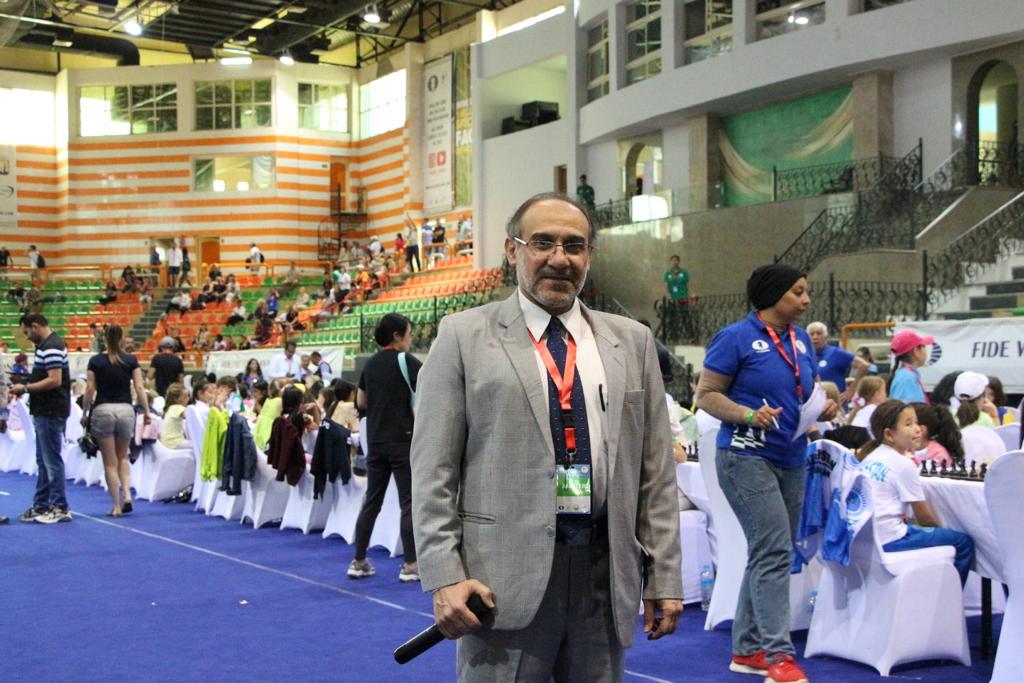
11. As a FIDE arbiter lecturer, which has been the most topic your students fail and why do they fail it?
Firstly, I would like to inform you that the lecturer is restricted to a certain number of questions at different levels, including easy questions to encourage students by 20%-30%. Moderate questions 60%, Questions with a difficult element, but mostly moderate at 10%-20%.
We have instructions from the ARB Education Committee to adhere to certain percentages according to the materials. The student must achieve 80 percent to pass the Seminar exam. For example Questions on Laws (55 marks), Questions on Tournaments (6 marks), Questions on Tie-Breaks (6 marks), Questions on Swiss Pairing (10 marks), Questions on Titles & Rating (15 marks), Questions on Arbiters (3 marks), Questions on Anti-Cheating (Fair Play) (5 marks).
Through my courses, I found that most of the students’ mistakes were in calculations in the questions related to the rating calculations as well as the calculations of the players’ titles.
12. In conclusion, give us one question your students have failed the most and give us the best way to answer it.
It is a question related to the Swiss system and how pairing works. Some of them write the answers in numbers without writing the steps. Pairing works without committing to the players’ colors and floating up or down.
As you know, In the Swiss system, pairing takes place in the first round according to the rating of each player, so that two players who are close in rating meet. After the first round, pairing is based on the player’s points, where winners are paired with similar winners, and losers with similar losers, but sometimes exceptions occur to avoid repeating playing with the same color three times in a row except in the last round. So, through the answers, I discovered that some students lack knowledge of the rules of the Swiss system.
From round 2 the players are divided into groups based on their scores. Within each group, they are arranged according to some criteria, usually their rating. Next, the top half of the players are paired with the bottom half, taking into account the color factor and the float down and up
Prepared by IA Chanda Nsakanya
